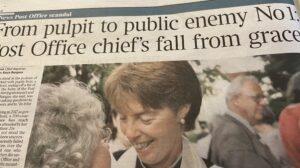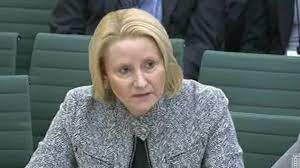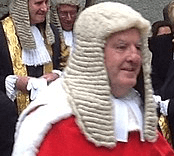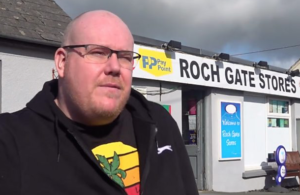- Return to sender - 20th February 2026
- Legal eagle - 19th February 2026
- Round Robin - 19th February 2026

The IT company at the centre of the huge Post Office (PO) scandal being accused of “fudging the issue” and “apologising far too late”, as well as major questions now about the awarding of contracts to it, again put centre stage the crucial role of Wales.
Fujitsu say they plan to compensate victims, but have been described as using “gobbledygook”.

In a statement on Thursday executives stated: “The Fujitsu Group regards this matter with the utmost seriousness and offers its deepest apologies to the sub-postmasters and their families.
“The UK statutory public inquiry, to which our UK subsidiary is providing full cooperation, is examining complex events that have unfolded over many years, and we remain steadfast in our commitment to this cooperation.
They added: “The Fujitsu Group hopes for a swift resolution that ensures a just outcome for the victims”.
 But as The Economist has put it: ‘Paula Vennells, the CEO of the Post Office between 2012 and 2019, responded to concerns about Horizon (Fujitsu’s system) by referring to assurances from Fujitsu that the software was “like Fort Knox”. What that really meant was that the Post Office did not know what was going wrong’.
But as The Economist has put it: ‘Paula Vennells, the CEO of the Post Office between 2012 and 2019, responded to concerns about Horizon (Fujitsu’s system) by referring to assurances from Fujitsu that the software was “like Fort Knox”. What that really meant was that the Post Office did not know what was going wrong’.
More bad publicity for Ms Vennells has followed this. At the weekend, the front page splash in the Sunday Mirror screamed: “POST Office chiefs were filmed enjoying a lavish company bash as it fought wrongly jailed sub-postmasters in court.”.


“Last night there was fury at video footage of boss Paula Vennells dancing and singing along to star guest Pixie Lott.”
Ms Vennells handed back her CBE, but in a controversial statement appeared to minimise her own role, and blamed Fujitsu’s Horizon.
Two days before this came further controversy, as The Independent declared on its front page: “Fujitsu boss: We knew right from the start about Post Office IT problem”.

Meanwhile as the statement from Fujitsu was issued attention turned to the gigantic number of contracts which have been awarded to the company.
Questions are now mounting about those contracts in the public sphere, and there may be a historical explanation.
In the early noughties Fujitsu took over ICL, which had been publicly owned. A bug-ridden IT system designed to support the Department of Social Security (DSS), as well as the Post Office (P0), (called Pathways) was inherited by the firm, and ultimately abandoned, so another offering from them later seemed the natural choice to police small post offices – Horizon.
 An anonymous member of the Horizon team speaking to Computer Weekly (CW) in 2021 proclaimed: “everybody in the building knew… (the software) was a bag of shit, it had gone through the test labs God knows how many times, and the testers were raising bugs by the thousand”.
An anonymous member of the Horizon team speaking to Computer Weekly (CW) in 2021 proclaimed: “everybody in the building knew… (the software) was a bag of shit, it had gone through the test labs God knows how many times, and the testers were raising bugs by the thousand”.

HM Treasury and HMRC are among 21 public sector organisations now being asked by MPs to reveal details about the contracts given to Fujitsu.
The Commons Treasury Committee says it wants to discover the extent to which taxpayers’ money has been spent on contracts with the company since 2019.

The Welsh Government (WG) has also faced criticism over the Fujitsu contracts awarded in Wales.
One of the contracts there relates to Smart ticketing systems for concessionary travel schemes by Transport for Wales, and together with another, it is worth £2,037,251.46.
It began in August 2022, meaning it was awarded after the scandal came to light and following the launch of a UK Government inquiry the previous year.
These extraordinary events highlight the central part Wales has played in the enormous controversy, and they shine the spotlight, too, on the ITV drama ‘Mr Bates Vs The Post Office’, that kick-started the latest round of publicity, and which was filmed in North Wales.

In an emergency business select committee hearing in the UK Parliament, which was prompted by outrage after the broadcast, Fujitsu admitted the firm have a “moral obligation” to contribute to compensation for sub-postmasters and mistresses wrongly prosecuted as a result of its faulty software. Paul Patterson said Fujitsu gave evidence to the PO that was used to prosecute innocent managers, and added that the PO knew about “bugs and errors” in their Horizon accountancy software early on. Nick Read, the Chief Executive Officer (CEO) of the PO, appeared alongside Mr Patterson in front of the committee, but was criticised for not having provided information to them about key events in the timeline.


More than 700 sub-postmasters and mistresses were prosecuted based on faulty data from the software (or because it allowed unauthorised access to computer records), between 1999 and 2015, with some going to prison for false accounting and theft, while many were financially ruined. There were four suicides.
One of those wrongly accused of taking money told The Eye: “Fujitsu are fudging the issue, and are apologising far too late. They spout incomprehensible gobbledygook – my life has been ruined because of what happened to me.”.
 The star of the drama (actor Toby Jones) portrays the despair of former Llandudno sub-postmaster Alan Bates, as he reads that Ms Vennells had been given the honour originally, “for services to the Post Office…”.
The star of the drama (actor Toby Jones) portrays the despair of former Llandudno sub-postmaster Alan Bates, as he reads that Ms Vennells had been given the honour originally, “for services to the Post Office…”.
It has now been revealed that Ms Vennells’ CBE was pushed through by Theresa May’s Government, DESPITE the fact that the honours committee raised concerns about the scandal.

Financial issues are also coming to the fore today, amid growing alarm that some of the innocent victims have yet to receive a penny in compensation.
Questions are being asked about how the PO’s books were signed off by external auditors, and as one of those wrongly accused said in the transmission: “Where did the money go?!”. Accountants from EY and PwC are braced to be put under the microscope at the public inquiry into it all. It’s emerged that the PO may have underpaid more than £100 million in tax while overpaying its senior executives (like Ms Vennells). Dan Neidle of Tax Policy Associates has proclaimed that the PO paid less tax by deducting payments to victims of the scandal from its profits.


Although she appeared to apologise (while seemingly minimising her own role), it is claimed that Ms Vennells bears responsibility for prolonging the torment of those who have been affected, and still faces questions about the receipt of bonuses worth £2.2 million.
The central role of Wales in all of this is clearly a fundamental issue.

The ITV transmission which lies behind the headlines which was filmed in North Wales, was only a few weeks ago, although the problems began years ago.
It followed the story of Alan Bates, who with his wife Suzanne Sercombe, used life savings in 1998 to buy the PO branch in Llandudno.
Mr Bates refused to accept liability like many other sub-postmasters and sub-postmistresses, yet officials terminated their contract with just three months’ notice. It meant the couple lost the £65,000 they had invested.

A key player at the PO then was Angela van den Bogerd. She too featured in the broadcast and, along with the head of the organisation, Ms Vennells, was described as part of “the gruesome twosome!”.
Ms van den Bogerd was named afterwards as ‘Head of People’ at the Football Association of Wales (FAW). Her arrival led to the abrupt departure of the organisation’s headline-grabbing chief at the time, Jonathan Ford, who left losing a vote of no-confidence, following an astonishing civil war inside the organisation, which has never been fully explained by the mainstream media. Ms van den Bogerd’s appointment came despite the fact that she had been found by a judge to have “obfuscated” and “misled” a court, and she is shown in the drama in tears as she reads the judgement.

She was an integral part of the PO’s complaints and mediation scheme, and in 2015 Ms van den Bogerd appeared before MPs at another select committee inquiry into Fujitsu’s Horizon computer system (which played a part in the show too). She has also co-authored at least one internal PO report on its relationship between sub-postmasters and mistresses, and that system, while in 2018 she was made ‘Business Improvement Director’. Ms van den Bogerd has now departed from the FAW as well.


The Eye’s disclosure of crucial facts like these, came amid news that one sub-postmaster who lived between Swansea and Merthyr Tydfil explained how he (along with others) had tried to take his own life, while another Welshman talked about his marriage going on the rocks.
Mark Kelly, who ran the Brondeg Post Office, from 2003 until 2006, has like others described publicly the terrible impact on him, of the wrongful accusation from the PO that he had stolen money. He said that it had “made me feel guilty and depressed, over the years, I started then to blame myself and I tried to end my life a few times”.

But Mr Kelly is not alone in having these suicidal thoughts because of the incorrect allegations.
Another former PO worker, Jennifer O’Dell, said she had also considered killing herself and suffered from recurring night terrors. She had been wrongly accused of stealing almost £10,000 from a post office in Cambridgeshire. Speaking at the end of the first week of an independent inquiry into what happened, Ms O’Dell said she had researched how to take her own life, and suffered from depression and Post-Traumatic Stress Disorder (PTSD).

The inquiry (led by retired Welsh judge Sir Wyn Williams) was to hear evidence about the design of the defective computer system which made the mistakes (or allowed the unauthorised access), as well as the failings in the investigation.
Mr Kelly, who was one of those accused between 2000 and 2014, said: “I can’t really socialise as much as I used to and I can’t actually manage some tasks – I can’t handle stress”. He has described how he went to senior managers at the organisation, believing he had worked out how the errors were happening, but he said the company “didn’t want to know” and wanted to “bury it”. He eventually resigned, losing the business and then his house, and it meant he and his wife decided not to start a family.
He stated: “We originally hoped to keep the office going and we would start a family – it was a four-bedroom house. But after the breakdown, we lost the house from it all, we thought we couldn’t have a family ’cause we had no house and no stability”.

Mr Kelly, who now runs a mobile phone repair and accessory shop in Neath Market, hopes his story will “help everyone”.
A further victim of the PO’s tactics, Tim Brentnall, from Roch in Pembrokeshire, said the scandal led to the breakdown of his marriage because of “trust issues”, and he was prosecuted in 2010 after a £22,000 ‘shortfall’ was discovered at his branch, but his conviction was overturned. Mr Brentnall has told how his sister, who ran a local hotel at the time, was also affected because “people tarred her with the same brush”. And he said in the years that followed his conviction, there was a “whispering campaign”, in the community with people calling him a “thief” and a “fraudster”.

Following the overturning of his convictions, he is now working in the Roch shop again, but said the business would never recover financially with its turnover down from £500,000 to £100,000.
In addition to apologising, the PO declared: “In addressing the past, our first priority is that full, fair and final compensation is provided and we are making good progress”.

It doesn’t sound like ‘good progress’ if there are accusations of “apologising too late”, and there are big question marks now over the contracts handed to the IT company at the heart of it, following a scandal which had been happening FOR YEARS…
The memories of our Editor, Welshman Phil Parry’s, remarkable decades long award-winning career in journalism as he was gripped by the rare and incurable neurological disabling condition Hereditary Spastic Paraplegia (HSP), have been released in a major book (including looking behind the headlines of important events like this), called ‘A GOOD STORY’. Order the book now!

Regrettably publication of another book, however, was refused, because it was to have included names.
Tomorrow – with the regulator, Ofcom, about to receive a report on the takeover of The Daily Telegraph by an investment fund ultimately controlled by a foreign national which was paused because of public interest concerns, our Editor, Welshman Phil Parry who has been a journalist for 40 years, looks at the vital importance of having an independent and free media.










